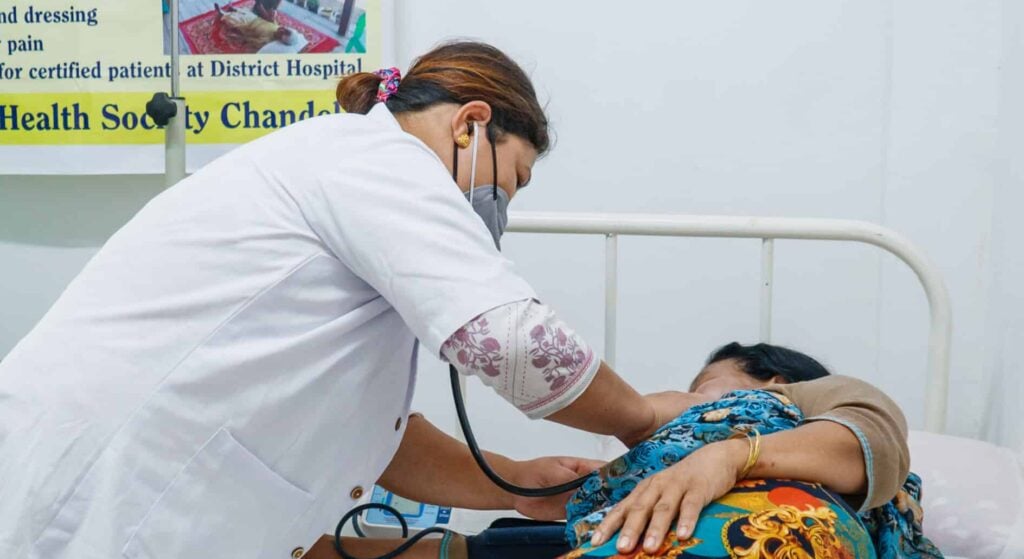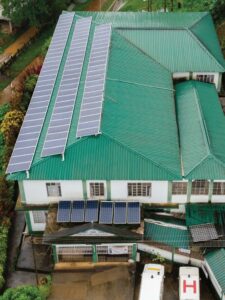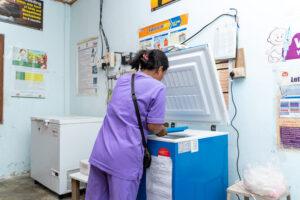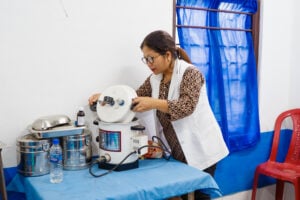SELCO Foundation
Energy for Healthcare
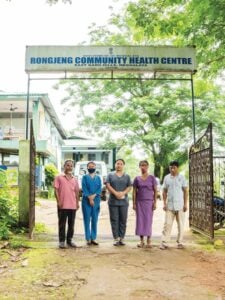
Renewable Energy and New Equipment for Public Health Facilities
SELCO Foundation, Energy for Healthcare
Ensuring universal health coverage for under-served, rural and vulnerable populations sustainably requires a transformative approach that ensures quality health services are delivered at health facilities, while also keeping in mind the actual cost of accessing health services by last-mile communities.
Creating such inclusive and resilient health systems could be catalysed by providing a decentralised renewable energy system – based on how much energy is needed through independent solar panels – that would ensure uninterrupted critical care services for communities impacted by growing climate risks and disasters. Use of renewable energy would also contribute to India’s climate mitigation strategies and emissions reduction targets.
Our public health system consists of a hierarchy of health facilities. Small-scale health facilities in the villages called health sub-centres are the main deployment posts- the first points of care. Over 45,000 primary health centres and sub-centres in the country are in areas completely without electricity, due in part to the surrounding terrain, while an additional 42,000 of such facilities estimated to be needed have yet to be built, mostly in last-mile communities.
Currently, many health facilities across the country face major challenges with energy availability and reliability, due in part to their remoteness.
With Sustainable Development Goal 7 of providing affordable and clean energy in mind, this is an opportunity to leapfrog the grid and traditional fuels by adopting decentralised sustainable energy solutions for better healthcare services.
The provision of healthcare is gaining importance with the worsening effects of warming. As climate-induced disease outbreaks become more frequent, health facilities are burdened by larger numbers of patients and may need to treat them by relying on expensive, uncertain or polluting energy.
The health risks for people include heat stress, which further increases the chance of high-risk pregnancies, as well as heat stroke and bedsores among the elderly and people with disabilities. The warming weather also affects the well-being of healthcare workers and thus their capacity to care for patients.
The increasingly frequent extreme weather and climate disasters often impact the communities at the lower rungs of the socioeconomic ladder. The floods and cyclones in the region can severely damage the grid infrastructure which may take months to repair. In such periods, the functioning of the health facilities which is most critical, can be significantly impacted by the failure of centralised energy infrastructure. Additionally, limited access to diesel or kerosene for backup generators makes it difficult for health facilities to be operational. These cascading effects are harming the marginalised disproportionately, and there is a need to think of energy systems which are decentralised and improve resilience at the grassroots by building their capacity to adapt to change.
Health facilities are especially crucial as climate change is also hampering food security and changing patterns of food access. Changing food consumption patterns have caused rural areas to increasingly face challenges with non-communicable diseases such as diabetes and hypertension. These lifestyle diseases require regular tracking and hand-holding which need us to rethink our ways of designing public health systems that are decentralised and easier to access.
Case in Focus: Meghalaya
Meghalaya is a state in the northeastern region of India that has high precipitation and hilly terrain, making it prone to landslides, heavy rain and flooding. These disrupt people’s access to larger hospitals or health facilities located in larger towns. Four in five people in the state of 2.9 million live in villages in hilly areas and depend on public health facilities for their healthcare needs. Thus while smaller health facilities are provided in Meghalaya, they do not comprehensively safeguard people’s health and well-being. Frequent power cuts further impede health workers’ ability to respond to patient needs, resulting in compromised delivery of essential care.
Working in an under-equipped facility without fans, lighting or proper equipment puts medical staff under great pressure, making it difficult for them to carry on with their jobs effectively. It also results in major gaps in critical life-saving services like institutional deliveries, emergency response, vaccine storage, and the proper use of medical equipment like baby warmers, suction machines or even artificial lighting during deliveries.
Using renewable energy to power these facilities would not only mitigate emissions but improve the resilience of health infrastructure delivery whilst in the climate crisis. With the National Health Mission of Meghalaya and a network of local partners, the SELCO Foundation has worked to upgrade 100 health sub-centres in Meghalaya. As each sub-centre serves about 3,000 people the program has impacted about 300,000 lives.
The program begins by recording community needs first-hand in conversations with patients, auxiliary nurses, doctors and support staff to co-design a health solution and accordingly a decentralised energy system. For example, an initial assessment in Meghalaya showed the need for upgrading the first points of care – primarily used for diagnosis of basic diseases, immunisation and tracking of mothers and young children – to include delivery points and vaccine storage. This resulted in a plan with the State Health Mission to upgrade the sub-centres to be equipped for delivery and vaccine storage. Medical equipment selected for the centre was able to meet the demand of the centre and more importantly, they are energy efficient to reduce the energy demand and costs. The services and relevant energy systems provided include:
- Medical care and basic diagnostics related equipment: such as lighting for operations, electricity for microscopes, instrument sterilisers, kits to combat non-communicable disease
- For maternal and childcare units: suction machines, baby warmers, operating tables, refrigerators and deep freezers for vaccines
- Basic energy upgrade of staff quarters to ensure the well-being and safety of the staff residing in these facilities.
SELCO Foundation ensures local ownership and proper maintenance with capacity building through:
- Regular training workshops with health practitioners and facility staff on the proper use of equipment
- Creating systems that ensure timely and regular maintenance and servicing of the solar energy system and equipment
- Partnering with local and state government health officials for greater involvement in decision-making processes, leveraging funds towards capital expenses, and committing funds toward system upkeep with proper budgeting of operational expenses.
Decentralised renewable energy systems implemented in this manner, with an aim to boost the overall health system, have resulted in improved quality and timeliness of service delivery as well as the safety and well-being of staff and patients. This approach brings quality health services closer to the last-mile communities, which also results in reduced referrals and burden on larger centralised health facilities. It is incredibly encouraging for all parties in this work to hear about mothers giving birth to their newborns in a health centre for the first time in that village.
Additionally, this initiative of solar powering of 100 health sub-centres, in partnership with the Government of Meghalaya, will also help prevent 1,490 metric tonnes of CO2 emissions over 20 years.
Partnering with the State Health Mission in Meghalaya, SELCO Foundation has already powered close to 50% of the State’s health facilities with solar energy in a similar way. Additionally, new health facilities being built by the State are designed to be energy efficient, and integrated with decentralised renewable energy systems from the beginning. The partnership with the State aims to equip all the remaining health facilities in the state with solar energy by December 2023.
In addition to Meghalaya, SELCO Foundation has also partnered with State Health Missions and State/District Health Departments to upgrade health facilities with solar energy in Manipur, Odisha, Karnataka and Mizoram. Together with the Ministry of Health and Family Welfare, Government of India, as well as National Health Systems Resource Centre, SELCO Foundation has also set an ambitious target to solar-power 25,000 health centres in 12 states by 2026. There is a potential to prevent 42 tonnes of CO2 emissions in each of these health facilities over 20 years (the life of the asset) by using decentralised renewable energy with efficient equipment. Thus the project would prevent over 3.6 million tonnes of CO2 equivalent emissions in 25,000 health facilities over 20 years.
Every week or the other we receive heartwarming reports of first-time successful deliveries at a health centre and it encourages us to make it a norm.
Sustainable Energy, Led Climate Action Program (SELCAP) by SELCO Foundation, brings together evidence that showcases 20 solutions driven by SDG 7. These solutions aim to empower the most vulnerable to adapt to climate change while also setting on a new trajectory of development which is powered by sustainable energy and also mitigates future emissions.
The inception report for the ‘Sustainable Energy Led Climate Action Program’ can be accessed here.
Videos
















